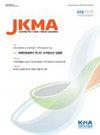维持和发展神经外科领域基本医疗服务所需的努力
IF 0.5
Q3 MEDICINE, GENERAL & INTERNAL
引用次数: 0
摘要
背景:虽然神经外科自然被纳入基本医疗服务(EMS),但目前韩国保健福利部制定的EMS中并未包括神经外科。因此,截至2023年,我想描述脑外科医生数量逐渐减少的原因和现状,脑外科医生是EMS的一个重要轴,以及维持和发展EMS所需的努力。当前概念:神经外科住院申请率在过去的20年里从每年80 - 120没有太大的偏离;因此,它似乎不包括在所谓的“垂死的EMS”中。然而,在4年住院医师培训期间退出的人数高达15.43%,住院医师培训后的神经外科专科新生人数逐渐减少。脑外科医生的数量正在减少,因为许多神经外科医生专攻脊柱而不是大脑。而且,与经济合作与发展组织(oecd)国家相比,神经外科手术的费用非常低,再加上韩国的残酷现实,使脑外科医生处于危险的境地。讨论与结论:为了挽救必要的医疗神经外科医生,特别是脑科专科医生,使医疗费用切合实际,提高神经外科医生的地位,改善对治疗和手术过程中发生的医疗事故的过度刑事处罚是非常必要的。如果不给从事危险手术、缩短医生寿命的神经外科医生适当的补偿,韩国神经外科就没有未来。本文章由计算机程序翻译,如有差异,请以英文原文为准。
Efforts needed to maintain and develop essential medical services in the neurosurgery field
Background: Although it is naturally included in essential medical services (EMS), neurosurgery is not included in the current EMS set by the Ministry of Health and Welfare of South Korea. Therefore, as of 2023, I would like to describe the causes and current status of the progressively decreasing number of brain surgeons, which are responsible for an important axis of EMS, and the efforts needed to maintain and develop EMS.Current Concepts: The resident application rate for neurosurgery has not deviated much from 80 to 120 annually over the past 20 years; therefore, it does not seem to be included in the so-called “dying EMS.” However, the number of individuals who withdraw during the 4-year resident training period is as high as 15.43%, and the number of new neurosurgery specialists after resident training decreases gradually. The number of brain surgeons is declining, as many neurosurgeons specialize in the spine rather than the brain. Moreover, the extremely low cost of neurosurgery compared to that of Organization for Economic Co-operation and Development countries and cruel reality of Korea sets brain surgeons in a dangerous situation.Discussion and Conclusion: To save essential medical neurosurgeons, especially brain specialists, it is extremely necessary to make the medical fee realistic, improve the status of neurosurgeons, and improve the excessive criminal punishment for medical accidents that occur during treatment and surgery. There is no future for Korean neurosurgery without proper compensation for neurosurgeons who work with many dangerous surgeries and shorten the lifespan of doctors.
求助全文
通过发布文献求助,成功后即可免费获取论文全文。
去求助
来源期刊

Journal of The Korean Medical Association
Medicine-General Medicine
CiteScore
0.50
自引率
0.00%
发文量
84
审稿时长
4-8 weeks
期刊介绍:
The Journal of the Korean Medical Association (JKMA) is the official peer-reviewed, open-access, monthly journal of the Korean Medical Association (KMA). It contains articles in Korean or English. Its abbreviated title is ''J Korean Med Assoc''. The aims of the Journal include contributing to the treatment of and preventing diseases of public health importance and to improvement of health and quality of life through sharing the state-of the-art scientific information on medicine by the members of KMA and other national and international societies.
 求助内容:
求助内容: 应助结果提醒方式:
应助结果提醒方式:


